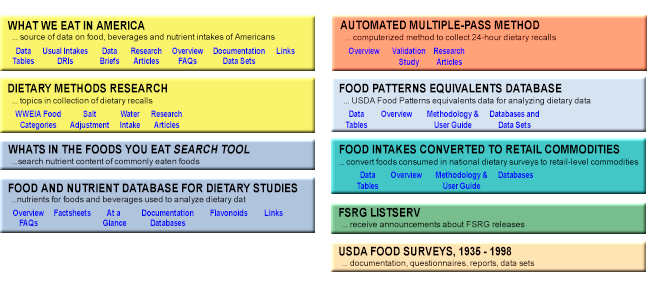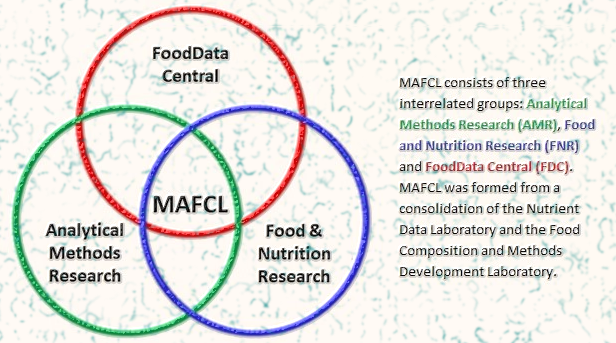Photo Carousel Links
The Beltsville Human Nutrition Research Center (BHNRC) is the oldest and most comprehensive of six human nutrition research centers within the Agricultural Research Service. BHNRC laboratories conduct multi-disciplinary basic science and applied human nutrition research. Our research is important to policy-makers, food producers, educators, other scientists and consumers in better understanding the relationships between agriculture, diet, and health.
The mission of the Food Surveys Research Group is to monitor and assess food consumption and related behavior of the U.S. population by conducting surveys and providing the resulting information for food and nutrition-related programs and public policy decisions.
The mission of the Methods and Application of Food Composition Laboratory (MAFCL) is to identify critical food composition needs for researchers, policymakers, food producers and consumers. MAFCL develops and maintains food composition databases for foods available in the United States; conducts research on the impact of the environment, production, and preparation on food composition and intake; and develops new and improved analytical methods.
Research in the Food Components & Health Laboratory (FCHL) helps to determine recommendations for dietary intakes that are consistent with disease prevention and health promotion, focusing on antioxidants, bioactive food components, and energy nutrients and their relation to chronic diseases including obesity, cancer, and cardiovascular disease.
The Diet, Genomics, and Immunology Laboratory (DGIL) focuses on molecular and cellular bases of health promoting food components in prevention of chronic disease, the role of antioxidant polyphenols in brain and heart function associated with obesity and metabolic diseases, and diet and immune function related to infectious and allergic disease.
Mission
The mission of the Beltsville Human Nutrition Center (BHNRC) is to define, through research, the role of foods and its components in optimizing human health and reducing the risk of nutritionally related disorders. Scientists at the Center approach this mission by conducting research to understand how the needs for dietary components are influenced by genetic, physiological state, social/behavioral dynamics, and environmental factors. The research is aimed at understanding the relationship between eating decisions coupled with insults (excess calories, viruses, bacteria, and environment pollutants) on the quality of life and overall health as a function of age, sex and ethnicity for U.S. citizens.
The Center consists of six (6)laboratories. In addition to federal employees, over 60 additional scientists and support staff funded by cooperating agreements with multiple institutions, organizations and federal programs are involved in ongoing research projects.






.jpg)
.jpg)